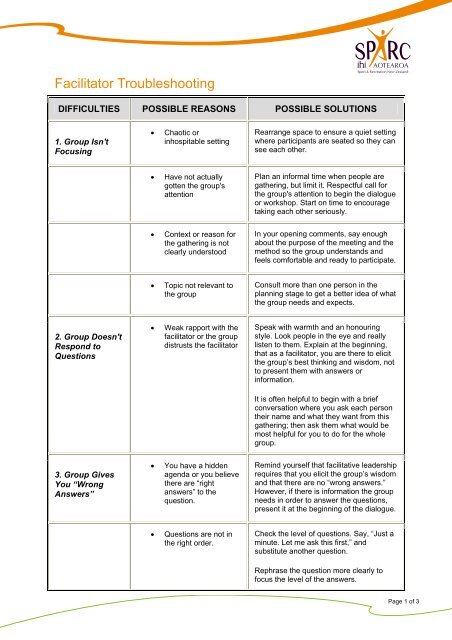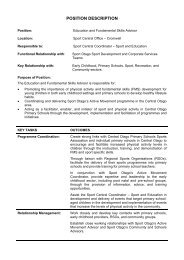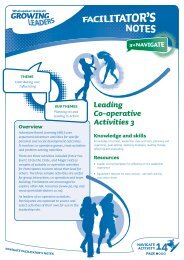Facilitator Troubleshooting checklist (PDF, 65 Kb)
Facilitator Troubleshooting checklist (PDF, 65 Kb)
Facilitator Troubleshooting checklist (PDF, 65 Kb)
You also want an ePaper? Increase the reach of your titles
YUMPU automatically turns print PDFs into web optimized ePapers that Google loves.
<strong>Facilitator</strong> <strong>Troubleshooting</strong><br />
DIFFICULTIES POSSIBLE REASONS POSSIBLE SOLUTIONS<br />
1. Group Isn't<br />
Focusing<br />
• Chaotic or<br />
inhospitable setting<br />
Rearrange space to ensure a quiet setting<br />
where participants are seated so they can<br />
see each other.<br />
• Have not actually<br />
gotten the group's<br />
attention<br />
Plan an informal time when people are<br />
gathering, but limit it. Respectful call for<br />
the group's attention to begin the dialogue<br />
or workshop. Start on time to encourage<br />
taking each other seriously.<br />
• Context or reason for<br />
the gathering is not<br />
clearly understood<br />
In your opening comments, say enough<br />
about the purpose of the meeting and the<br />
method so the group understands and<br />
feels comfortable and ready to participate.<br />
• Topic not relevant to<br />
the group<br />
Consult more than one person in the<br />
planning stage to get a better idea of what<br />
the group needs and expects.<br />
2. Group Doesn't<br />
Respond to<br />
Questions<br />
• Weak rapport with the<br />
facilitator or the group<br />
distrusts the facilitator<br />
Speak with warmth and an honouring<br />
style. Look people in the eye and really<br />
listen to them. Explain at the beginning,<br />
that as a facilitator, you are there to elicit<br />
the group’s best thinking and wisdom, not<br />
to present them with answers or<br />
information.<br />
It is often helpful to begin with a brief<br />
conversation where you ask each person<br />
their name and what they want from this<br />
gathering; then ask them what would be<br />
most helpful for you to do for the whole<br />
group.<br />
3. Group Gives<br />
You “Wrong<br />
Answers”<br />
• You have a hidden<br />
agenda or you believe<br />
there are “right<br />
answers” to the<br />
question.<br />
Remind yourself that facilitative leadership<br />
requires that you elicit the group’s wisdom<br />
and that there are no “wrong answers.”<br />
However, if there is information the group<br />
needs in order to answer the questions,<br />
present it at the beginning of the dialogue.<br />
• Questions are not in<br />
the right order.<br />
Check the level of questions. Say, “Just a<br />
minute. Let me ask this first,” and<br />
substitute another question.<br />
Rephrase the question more clearly to<br />
focus the level of the answers.<br />
Page 1 of 3
• The question is not<br />
sufficiently clear or<br />
focused.<br />
If the group really trusts that you do not<br />
have a specific answer in mind, you might<br />
give an example to give them an idea of<br />
the type of answer you are looking for.<br />
4. Group<br />
Responding<br />
With Superficial<br />
Answers<br />
• Members of the group<br />
feel unsafe; the group<br />
is not ready to<br />
participate.<br />
Try less serious conversation topics until<br />
the group begins to trust you and the<br />
process and is confident that they will be<br />
taken seriously and/or are willing to take<br />
responsibility for the results.<br />
• Questions are not<br />
specific enough.<br />
Test questions in advance by asking them<br />
of others in your NSO/RST or club. If<br />
possible share questions with a cofacilitator<br />
or mentor.<br />
• Participants have a<br />
hidden agenda.<br />
Ask more specific questions to give an<br />
opportunity for hidden agendas to become<br />
explicit.<br />
5. Some<br />
Participants<br />
Dominate<br />
• Perhaps they don’t<br />
feel they have been<br />
heard (yes, even if the<br />
group finds this hard<br />
to believe!).<br />
Listen seriously, demonstrate “hearing<br />
them” by writing, or active listening, and<br />
respectfully cutting off–”I think we’ve got<br />
your main point(s). I’d love to hear more at<br />
the break. Now, somebody else.”<br />
• The person who is<br />
charged with<br />
responsibility for the<br />
outcome doesn’t trust<br />
the group.<br />
Take that person aside, check for<br />
concerns, and let him or her know about<br />
possible consequences of dominating the<br />
process and how his or her style of<br />
participation affects the outcome. Address<br />
his or her concerns about the process with<br />
the group if appropriate.<br />
• Conversation style<br />
may be too open or<br />
appear unstructured.<br />
Go around the room on a few questions.<br />
Ask each person to respond succinctly.<br />
• There is an imbalance<br />
between those who<br />
are quiet and those<br />
who love to speak in a<br />
group.<br />
Divide into small groups. You might mix<br />
quiet and expressive types together. Then<br />
have the groups report their results to the<br />
larger group.<br />
6. Group Goes<br />
• Group wants to<br />
escape topic or<br />
Reflect with the group about what’s<br />
happening, or by just asking the group,<br />
Page 2 of 3
Off on Tangents responsibility. “Are we getting off the topic here? If so<br />
why?”<br />
• Topic is unfocused or<br />
deemed irrelevant.<br />
Respectfully, but firmly, bring the group<br />
back to the subject.<br />
Restate the context and the questions.<br />
• <strong>Facilitator</strong> has let the<br />
group take control of<br />
the process or does<br />
not really believe the<br />
group knows what's<br />
best for the group.<br />
Remind yourself that facilitating is not<br />
about being liked by just letting the group<br />
“do what it wants to” but about allowing<br />
the group to get out its best wisdom.<br />
7. Not Getting<br />
Useful Answers<br />
• Topic not deemed<br />
relevant by group.<br />
Ask the group why the topic is not relevant<br />
or what needs to be dealt with at the<br />
moment instead.<br />
• Questions are not<br />
getting out useful<br />
information.<br />
Check prepared questions with your<br />
learning objective. Match your questions<br />
to ensure you are meeting the learning<br />
objectives of the session.<br />
8. Arguments<br />
Break Out<br />
• The group is following<br />
old patterns of being<br />
respectful of each<br />
other’s views or are<br />
unaware of ways to<br />
hear each other.<br />
Remind the group that each person's has<br />
a unique perspective. Intervene<br />
respectfully, letting the first person finish,<br />
then asking, "Now someone else, what is<br />
your perspective on this?" or "Someone<br />
else, what is a different perspective.<br />
• <strong>Facilitator</strong> is showing<br />
bias or not treating<br />
everyone’s answer<br />
with the same respect.<br />
Check yourself to see whether you are<br />
receiving all answers equally. Remind<br />
yourself that all responses are true or<br />
valid and are a part of the wisdom of the<br />
group.<br />
9. Group<br />
Challenges the<br />
<strong>Facilitator</strong><br />
• <strong>Facilitator</strong> is not<br />
showing selfconfidence.<br />
Let people know at the beginning that you<br />
are using a carefully thought-through<br />
process and are not pushing for any<br />
particular answers.<br />
• <strong>Facilitator</strong> conveys<br />
mixed messages of<br />
expert and questioner.<br />
Check your questions to ensure openendedness.<br />
Be sure you are not implying<br />
that “there is a right answer” by waiting for<br />
someone to respond to the question like<br />
you would.<br />
Page 3 of 3
















